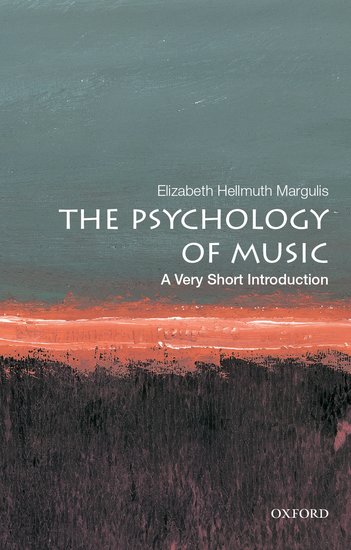Home >
A Very Short Introduction >
Psychology of Music (Art)
A Very Short Introduction | Art
Psychology of Music
ISBN: 9780190640156
Series: A Very Short Introduction
Psychology of Music (Art)
A Very Short Introduction Psychology of Music (Art) Media > Books > Non-Fiction > Education Books Now Available| Order Below |
ISBN
9780190640156 (10-digit ISBN: 0190640154)
- Description
- Key Features
- Series Description
- Table of Contents
- As an author acclaimed on both sides of the humanities-sciences divide, Margulis provides the kind of sensitive analysis that opens up the field to readers with diverse backgrounds, and readers who simply have a love for music
- Considers the very latest, up-the-minute research in the cognitive science of music
- Chronicles not only the potential of the psychology of music, but also its pitfalls, in hopes of advancing the field and its relationship with other modes of thinking about music
Music has been examined from multiple perspectives: as a product of human history, for example, or a product of human culture. But there is also a long tradition, intensified in recent decades, of thinking about music as a product of the human mind. Whether considering composition, performance, listening, or appreciation, the constraints and capabilities of the human mind play a formative role. The field that has emerged around this approach is known as the psychology of music. Written in a lively and accessible manner, this volume connects the science to larger questions about music that are of interest to practicing musicians, music therapists, musicologists, and the general public alike. For example: Why can one musical performance move an audience to tears, and another compel them to dance, clap, or snap along? How does a "pump up" playlist motivate someone at the gym? And why is that top-40 song stuck in everyone's head?
Oxford's Very Short Introductions series offers concise and original introductions to a wide range of subjects--from Islam to Sociology, Politics to Classics, Literary Theory to History, and Archaeology to the Bible.
Not simply a textbook of definitions, each volume in this series provides trenchant and provocative--yet always balanced and complete--discussions of the central issues in a given discipline or field. Every Very Short Introduction gives a readable evolution of the subject in question, demonstrating how the subject has developed and how it has influenced society. Eventually, the series will encompass every major academic discipline, offering all students an accessible and abundant reference library.
Whatever the area of study that one deems important or appealing, whatever the topic that fascinates the general reader, the Very Short Introductions series has a handy and affordable guide that will likely prove indispensable.
Please note: As this series is not ELT material, these titles are not subject to discount.
List of illustrations
Acknowledgments
1. The art and science of music psychology
2. The biological origins of music
3. Music as language
4. Listening in time
5. The psychology of music performance
6. Human musicality
7. The appetite for music
8. The future of the psychology of music
References
Further Reading
Index
Music has been examined from multiple perspectives: as a product of human history, for example, or a product of human culture. But there is also a long tradition, intensified in recent decades, of thinking about music as a product of the human mind. Whether considering composition, performance, listening, or appreciation, the constraints and capabilities of the human mind play a formative role. The field that has emerged around this approach is known as the psychology of music. Written in a lively and accessible manner, this volume connects the science to larger questions about music that are of interest to practicing musicians, music therapists, musicologists, and the general public alike. For example: Why can one musical performance move an audience to tears, and another compel them to dance, clap, or snap along? How does a "pump up" playlist motivate someone at the gym? And why is that top-40 song stuck in everyone's head?
Key Features
- As an author acclaimed on both sides of the humanities-sciences divide, Margulis provides the kind of sensitive analysis that opens up the field to readers with diverse backgrounds, and readers who simply have a love for music
- Considers the very latest, up-the-minute research in the cognitive science of music
- Chronicles not only the potential of the psychology of music, but also its pitfalls, in hopes of advancing the field and its relationship with other modes of thinking about music
Series Description
Oxford's Very Short Introductions series offers concise and original introductions to a wide range of subjects--from Islam to Sociology, Politics to Classics, Literary Theory to History, and Archaeology to the Bible.
Not simply a textbook of definitions, each volume in this series provides trenchant and provocative--yet always balanced and complete--discussions of the central issues in a given discipline or field. Every Very Short Introduction gives a readable evolution of the subject in question, demonstrating how the subject has developed and how it has influenced society. Eventually, the series will encompass every major academic discipline, offering all students an accessible and abundant reference library.
Whatever the area of study that one deems important or appealing, whatever the topic that fascinates the general reader, the Very Short Introductions series has a handy and affordable guide that will likely prove indispensable.
Please note: As this series is not ELT material, these titles are not subject to discount.
EASY ORDER FORM
PRICES LISTED INCLUDE CONSUMPTION TAX
Price Before Tax:
¥1,790


